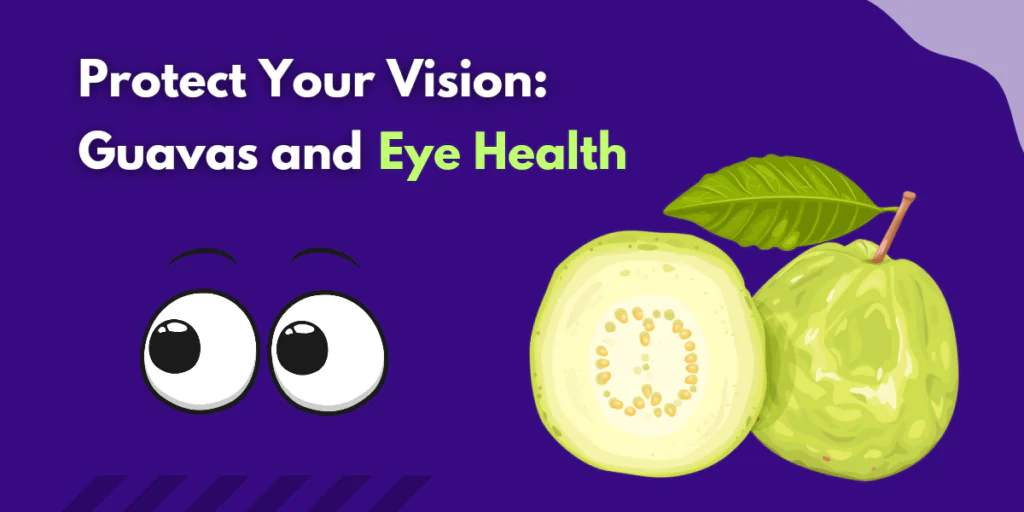Good vision is a gift we often take for granted until issues arise. With modern lifestyles straining our eyes due to excessive screen time and environmental factors, maintaining optimal eye health has become more critical than ever. Fortunately, nature offers solutions like guavas, a nutrient-packed superfruit that can help protect your vision and support overall eye health. Let’s explore the science-backed benefits of guavas for your eyes and how to incorporate them into your daily routine.
Introduction
Guavas, a tropical fruit known for their sweet flavor and high nutritional value, are more than just a delicious snack. They are rich in vitamins, antioxidants, and carotenoids that play a crucial role in eye health. From reducing the risk of age-related macular degeneration (AMD) to preventing night blindness, guavas are a natural and effective way to preserve your vision for years to come.
Nutritional Highlights of Guavas for Eye Health
Guavas are packed with nutrients that directly benefit your eyes. Here’s a closer look at what makes them so beneficial:
- Vitamin A: Essential for maintaining good vision and preventing night blindness.
- Vitamin C: Protects the eyes from oxidative damage and supports collagen in the cornea.
- Beta-Carotene: Converts to vitamin A in the body, promoting eye health.
- Lutein and Zeaxanthin: Antioxidants that protect against UV damage and reduce the risk of AMD.
- Zinc: Supports the function of retinal cells and reduces oxidative stress.
How Guavas Benefit Your Eyes
Guavas contribute to eye health in several key ways, thanks to their nutrient-rich profile:
1. Prevents Night Blindness
Vitamin A deficiency is a leading cause of night blindness. Guavas provide a rich source of this vitamin, ensuring your eyes adapt to low-light conditions effectively.
2. Reduces the Risk of Macular Degeneration
Lutein and zeaxanthin in guavas help protect the macula, the central part of the retina, from age-related damage, reducing the risk of AMD.
3. Protects Against Cataracts
Vitamin C plays a critical role in preventing cataracts by reducing oxidative damage in the eye’s lens.
4. Enhances Retinal Health
Beta-carotene, zinc, and vitamin A work together to maintain the health of retinal cells, ensuring proper vision.
5. Shields Eyes from UV Damage
Antioxidants like lutein and zeaxanthin absorb harmful blue light and UV rays, protecting your eyes from damage.
Scientific Studies on Guavas and Eye Health
Research supports the role of guavas in promoting vision and preventing eye diseases:
- A study in the Journal of Nutrition highlights the role of vitamin A-rich foods like guavas in preventing night blindness.
- The American Journal of Ophthalmology emphasizes the importance of antioxidants, including vitamin C and lutein, in reducing the risk of cataracts and AMD.
- Research in the Food Chemistry Journal confirms the high antioxidant content of guavas, which protects the eyes from oxidative stress.
Guavas vs. Other Vision-Enhancing Foods
While many fruits and vegetables benefit eye health, guavas stand out due to their balanced nutrient profile. Here’s a comparison:
| Food | Key Eye Nutrients | Special Benefits |
| Guavas | Vitamin A, Vitamin C, Lutein | Prevents night blindness, AMD |
| Carrots | Beta-Carotene, Vitamin A | Enhances low-light vision |
| Spinach | Lutein, Zeaxanthin | Protects against UV damage |
| Oranges | Vitamin C | Prevents cataracts, supports collagen |
Best Ways to Incorporate Guavas for Eye Health
Adding guavas to your diet is simple and enjoyable. Here are some easy ways to make guavas a regular part of your meals:
1. Fresh Guavas
Eat them raw with the skin for maximum nutrient retention. Slice and enjoy as a healthy snack or add to salads.
2. Guava Smoothie
Blend guavas with other eye-friendly fruits like carrots or spinach for a nutrient-packed drink.
3. Guava Leaf Tea
Brew guava leaves in water to create a tea that offers additional antioxidant benefits.
4. Guava Salsa
Chop guavas and mix with onions, tomatoes, and lime for a refreshing salsa that pairs well with meals.
5. Guava Desserts
Incorporate guavas into yogurt, sorbets, or fruit parfaits for a sweet yet healthy treat.
Sample Diet Plan for Eye Health Featuring Guavas
Here’s a sample daily diet plan incorporating guavas for optimal eye health:
| Time | Meal |
| Breakfast | Guava and spinach smoothie |
| Morning Snack | Fresh guava slices |
| Lunch | Guava salad with leafy greens |
| Afternoon Snack | Guava leaf tea |
| Dinner | Grilled chicken with guava salsa |
| Dessert | Guava yogurt parfait |
FAQs
How do guavas support eye health?
Guavas are rich in vitamin A, vitamin C, lutein, and beta-carotene, which protect the eyes from oxidative stress, UV damage, and age-related conditions.
Can guavas prevent night blindness?
Yes, the high vitamin A content in guavas helps prevent night blindness by supporting low-light vision.
Are guavas better than carrots for eye health?
Guavas and carrots both benefit eye health, but guavas provide a broader range of nutrients, including vitamin C and antioxidants.
How often should I eat guavas for eye health?
Eating 1–2 guavas daily can significantly contribute to maintaining healthy vision.
Do guava leaves benefit eye health?
Guava leaves are rich in antioxidants, which support overall eye health and protect against oxidative damage.
Can guavas replace vision supplements?
While guavas are an excellent natural source of eye-friendly nutrients, they may complement rather than replace specific vision supplements.
Conclusion
Protecting your vision is essential for maintaining quality of life, and guavas offer a natural, delicious way to support your eye health. With their high levels of vitamin A, antioxidants, and other essential nutrients, guavas help prevent common eye conditions like cataracts, night blindness, and macular degeneration. Start incorporating guavas into your daily meals to enjoy their incredible benefits for your vision and overall health.
Read Also: Exploring the Anti-Cancer Effects of Guavas
Medical Disclaimer: This article is for informational purposes only and is not a substitute for professional medical advice. Always consult with a healthcare provider for personalized recommendations.

